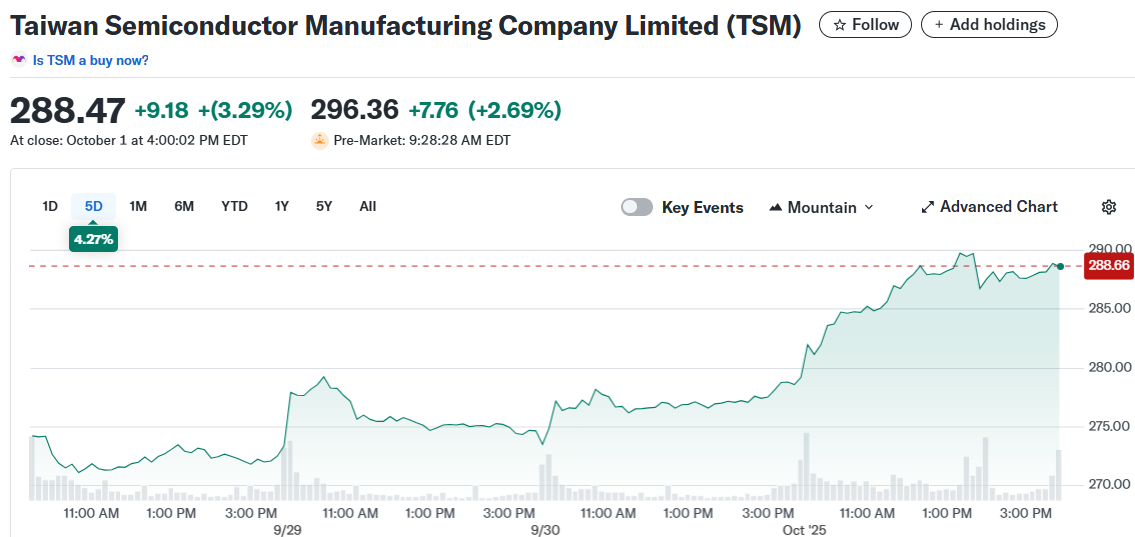TLDR
- TSMC (TSM) stock gained 1.18% in pre-market trading after Taiwan rejected the Trump administration’s 50:50 semiconductor sourcing policy.
- Taiwan’s Vice Premier said the country will not split chip production evenly with the U.S. and the policy wasn’t discussed in trade talks.
- The U.S. wants American companies to balance domestic and imported chip purchases equally, requiring over $500 billion in investment.
- Taiwan produces over 90% of the world’s advanced semiconductors while the U.S. makes only 12% of global chips.
- TSMC is investing $165 billion in Arizona facilities but keeping most production in Taiwan.
Taiwan Semiconductor Manufacturing Company stock rose Thursday after Taiwan’s government rejected a Trump administration semiconductor policy. Shares climbed 1.18% to approximately $292 in pre-market trading.

Taiwan Vice Premier Cheng Li-chiun told reporters the country would not support the proposed 50:50 chip sourcing policy. The plan would force U.S. firms to split semiconductor purchases equally between domestic and imported chips.
The rejection comes as Washington increases pressure on Taipei regarding chip production. The U.S. maintains a 20% tariff on Taiwanese imports. The Trump administration has discussed implementing 100% tariffs on semiconductors.
U.S. Pushes for Domestic Chip Production
Commerce Secretary Howard Lutnick outlined the administration’s vision this week. He wants half of chips sold in America made domestically. The other half would come from Taiwan.
Lutnick aims for 40% domestic chip production by the end of Trump’s term. Achieving this target would require over $500 billion in local investment.
Cheng updated the public on trade negotiations with Washington. She said Taiwan is exploring a high-tech strategic partnership with the U.S. However, the 50:50 policy was not part of discussions.
Taiwan runs a substantial trade surplus with America. Taipei is working to lower the current 20% tariff on exports.
The Vice Premier described Taiwan’s investment approach as expanding U.S. production capacity without relocating supply chains. The plan includes export credit guarantees and joint industrial cluster development.
Taiwan’s Semiconductor Dominance
Taiwan manufactures more than 90% of the world’s advanced semiconductors. TSMC supplies chips to major U.S. tech companies including Nvidia and Apple.
The U.S. produced only 12% of global semiconductors last year. The Semiconductor Industry Association projects worldwide chip sales will exceed $700 billion this year. The market could reach $1 trillion by 2030.
TSMC is expanding its American presence with manufacturing facilities in Arizona. The company increased its U.S. investment plans to $165 billion following a $100 billion pledge earlier this year.
Most TSMC production will remain in Taiwan. Cheng stressed that Taiwan’s semiconductor industry plans to stay rooted domestically while deploying technology worldwide.
What’s Next for TSMC Stock
The proposed 50:50 policy could benefit American chipmakers like Intel, GlobalFoundries, Micron, and Texas Instruments. However, Taiwan maintains it will not agree to the arrangement.
TSMC did not participate in the latest trade talks. Cheng confirmed the 50:50 plan was not mentioned during negotiations.
Wall Street analysts maintain a Strong Buy rating on TSMC shares. Nine analysts rate the stock a Buy while one recommends Hold. The average price target sits at $283.11, suggesting nearly 2% downside from current levels.
The stock gained 3.29% during Wednesday’s regular trading session before Thursday’s pre-market increase.





